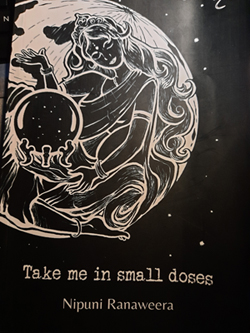Disruptive meditations
View(s): As if beginnings are ‘real’ events (they are not!), Ranaweera’s title poem, perhaps grants a reader the ‘real’ taste of poems to come. Take me in small doses, is a deceptive title for a poem that demands sensitivity to sustained uncertainty and anxiety. “I see fear in your eyes…” is not the predictable anxiety that the poem espouses; “walk through with you…I will” is not a phrase of reconciliation; the loving affirmations (“I will guard…Cherish you”) are not to be read literally: they are counterfeit optimism and illusionary embankments against the ‘spillovers’ of life. In other words, Ranaweera’s small doses are not small doses—they are a metaphor for fretfulness and improbability of life—imaginary herbal syrup in moderate doses for illnesses that even poems cannot cure. Life goes on…
As if beginnings are ‘real’ events (they are not!), Ranaweera’s title poem, perhaps grants a reader the ‘real’ taste of poems to come. Take me in small doses, is a deceptive title for a poem that demands sensitivity to sustained uncertainty and anxiety. “I see fear in your eyes…” is not the predictable anxiety that the poem espouses; “walk through with you…I will” is not a phrase of reconciliation; the loving affirmations (“I will guard…Cherish you”) are not to be read literally: they are counterfeit optimism and illusionary embankments against the ‘spillovers’ of life. In other words, Ranaweera’s small doses are not small doses—they are a metaphor for fretfulness and improbability of life—imaginary herbal syrup in moderate doses for illnesses that even poems cannot cure. Life goes on…
Motherhood occupies a fair portion of Ranaweera’s art, and Strange Fulfillment is one of them that outflanks maternity. Stretching motherhood to its unseen dark edges, the poem locates this bond as something that brings out more anxiety than a mother would attempt to reveal. “Morbid visions,” the poet says, obsess a mother whose protective instincts have spilled over and overwhelmed “babyhood snuggles.” Tragically, this spilled over ‘morbidity’ is what motivates the mothers at Missing Persons’ vigils: they are the mothers whose ‘morbid visions’ have come true, whose anxieties have become real-life plots. In their eyes glimmer the “traces of strange fulfillments.” It is this inherent anxiety of mothers to imagine the ‘morbid’ that sustains motherhood even when the child is absent. The mother’s love embraces not only the child…but tragic potentialities of existence.
References to folklore are generously scattered in Ranaweera’s collection, and a poem that invites attention from this theme is Resurrecting Ravana. Imitating the mass media, the poem opens on a string of incidents aligned to the legendary king (whose textual resurrection gripped the nation in an obsession of nationalism recently): “Monks erected statues and …Mirando started a cult” Ranaweera sniggers. If a return to the mythical past is a longing for perfection eluding the present, then Ranaweera’s poem puts a full stop to that. After the “special care…with his moustache” and after the dentist adjusts “his fangs” the poem’s finale goes: “…let’s drape a shawl over his neck…and teach him a strong, masculine smile.” The poem connects the corrupt power politics of the present to the mythical perfections of the past thus breaking the bridge between the two – history does not recover dear reader, Ranaweera chuckles, rather it duplicates.
The Lady Lawyer’s Society begins on a note of inviolability:“The lady lawyer’s society started off proceedings with religious observances.” The poem goes on to offer meeting minutes (in poetic idiom) and this is the location from which Ranaweera ambushes the reader. Invisible masculine vestige already possesses the ladies as they begin to seal the subtler gender traditions: “…lively debates on the length of the midriff shown…stand-offs about the number of pleats drawn..” If this is not enough, the poet employs a comical event to drive home her point by drawing in insignificant males into its core. Thus the ladies politely “bow to each other…Top to bottom…and to all the men they meet on their way.”
Ranaweera’s collection of poetry thrives on textual disruptions and brilliant disguises. What you read is not what you read! In terms of a debut collection, she has made a serious attempt to push the craft of poetry towards finding innovative modes of articulation supported by her acute social observations. Yet, the collection is not without a need for literary interventions to better itself. Ranaweera’s poems fall into graspable themes, and should have been arranged accordingly; perhaps she could avoid attempting to offer epiphanies for too many poems—endings are as false as beginnings and too many epiphanies risk foraying into prescriptive mores, which poets worth their salt might wish to avoid.
Finally, the semiotics of the cover do not necessarily complement the aesthetics of the poems—but then, these are hard times, and let’s not judge a book by its cover.
| Take me in small doses By Nipuni Ranaweera Published by Cayetaano, Colombo ISBN: 978-624-6132-00-2 Reviewed by Lal Medawattegedara | |
Searching for an ideal partner? Find your soul mate on Hitad.lk, Sri Lanka's favourite marriage proposals page. With Hitad.lk matrimonial advertisements you have access to thousands of ads from potential suitors who are looking for someone just like you.


